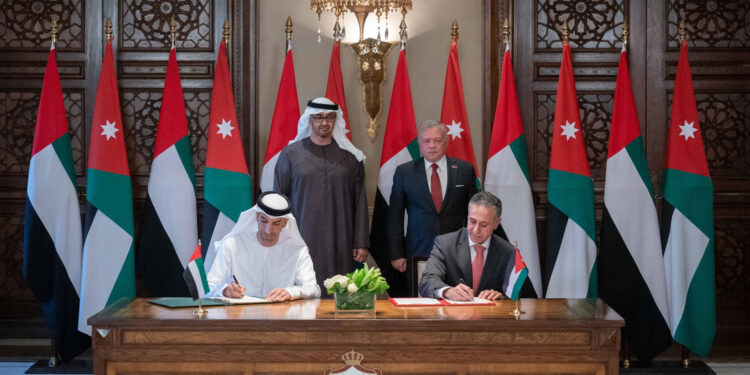Oman- The UAE and Jordan signed a comprehensive economic partnership agreement last Sunday, and another agreement for cooperation and mutual administrative assistance in customs affairs, to enhance investment and trade opportunities and economic cooperation.
This comes amid significant development in relations between the two countries, as several comprehensive memorandums of understanding were recently signed between the two countries, which included a package of investment projects and economic partnership worth up to $5.5 billion.
The Jordanian Minister of Digital Economy and Entrepreneurship, Sami Samirat, described the comprehensive economic partnership agreement as a “pivotal step” to enhance cooperation and bilateral relations between the two countries, to support digital transformation efforts in the Jordanian health sector, which he considered one of the most important vital sectors that directly affects the lives of citizens.
Smirat added in statements to (Al Jazeera Net) that the agreement contributes to developing the digital infrastructure for the health sector, by providing digital health services, developing a platform for exchanging health data, and providing remote health services, using virtual hospital technologies, which enables citizens to obtain Health care anytime, anywhere.
He pointed out that the agreement comes within the framework of implementing the economic modernization vision, which aims to improve the quality of government services and raise the efficiency of their provision, as the importance of accelerating digital transformation in vital sectors was emphasized to achieve a qualitative shift in service provision and raise the level of citizen satisfaction.
For his part, the economic expert, Muhammad Al-Bashir, said, “Emirati investments in Jordan come in the most important sectors, such as Abu Dhabi signing 4 agreements to establish a railway investment project with Jordan, worth $2.3 billion, to connect the port of Aqaba to the main mining areas in the Kingdom, such as potash and phosphate.” Pointing out that a large portion of Jordan’s exports depend on mining sources.
Investment opportunities
Al-Bashir added to (Al-Jazeera Net) that the agreement comes at an important time for Jordan, especially with the decline in investments in the Kingdom due to the high cost of energy, and the rise in taxes and bank interest on the investor.
He continued: “We hope that the Jordanian-Emirati agreement will not be a dead letter, and that what is stated in it will be implemented. In Jordan, we are counting on foreign investments because they fulfill the infrastructure requirements that depend on industry, trade, and agriculture in particular.”
He concluded by saying: “We are optimistic that this agreement will constitute an opportunity to develop industries in Jordan in light of the possibility of cooperation with sisterly Arab countries.”
According to observers, the UAE continues to implement its economic program based on comprehensive economic partnership with various countries of the world, as a main pillar of the UAE’s economic growth strategy aimed at expanding its trade relations, removing barriers to global trade, and improving access to Arab and international markets.
The Minister of Industry and Trade, Yaroub Al-Qudah, denied the existence of any clause in the UAE-Jordan agreement that includes regional cooperation, in response to fears that the agreement would serve Israeli commercial or industrial supply chains through Jordan.
He said that the agreement is higher, broader and larger than the free trade agreement between any two countries, and it is also broader than the Great Arab Free Trade Agreement, and that it came to simplify procedures and accelerate trade exchange between Jordan and the Emirates.
The Minister highlighted the details of the agreement between the two countries as follows:
- Exchange of goodsThe agreement contributes to mutual electronic connectivity between the customs of the two countries, and will also contribute to simplifying trade exchange procedures, with the UAE approving any Jordanian medicine registered in Europe, America, Canada, or Australia.
- Services tradeThe agreement stressed the liberalization and development of service sectors in a way that enhances competitiveness by removing restrictions on many sectors. 11 service sectors and more than 120 sub-sectors were covered, providing major investment opportunities.
- InvestmentThe agreement focused on establishing a joint investment council to promote and facilitate the establishment of joint investment projects between the business communities in the two countries.
- Digital commerce: Focus on strengthening areas of cooperation in digital trade and data protection.
- intellectual propertyThe agreement stressed the need to enhance the protection of intellectual property rights in a way that supports innovation, trade and investment between the two countries, and adherence to the highest international standards.
- Implementation of the agreementThe agreement stipulated the formation of a joint ministerial committee headed by the ministers of commerce from Jordan and the UAE, and subcommittees on trade in goods, small and medium enterprises, and economic cooperation.
The UAE is the fifth global trade partner with Jordan, and the second Arab trade partner, and the UAE market is the third in Jordan for export. In addition, the Abu Dhabi Fund for Development is one of Jordan’s most important development partners, through its contribution to financing many development projects and supporting the general budget. .
The growth rate of intra-trade between Jordan and the UAE – non-oil – reached 118%, during 2019-2023, which increased Jordan’s share of the UAE’s total non-oil foreign trade with Arab countries to reach 8%.



